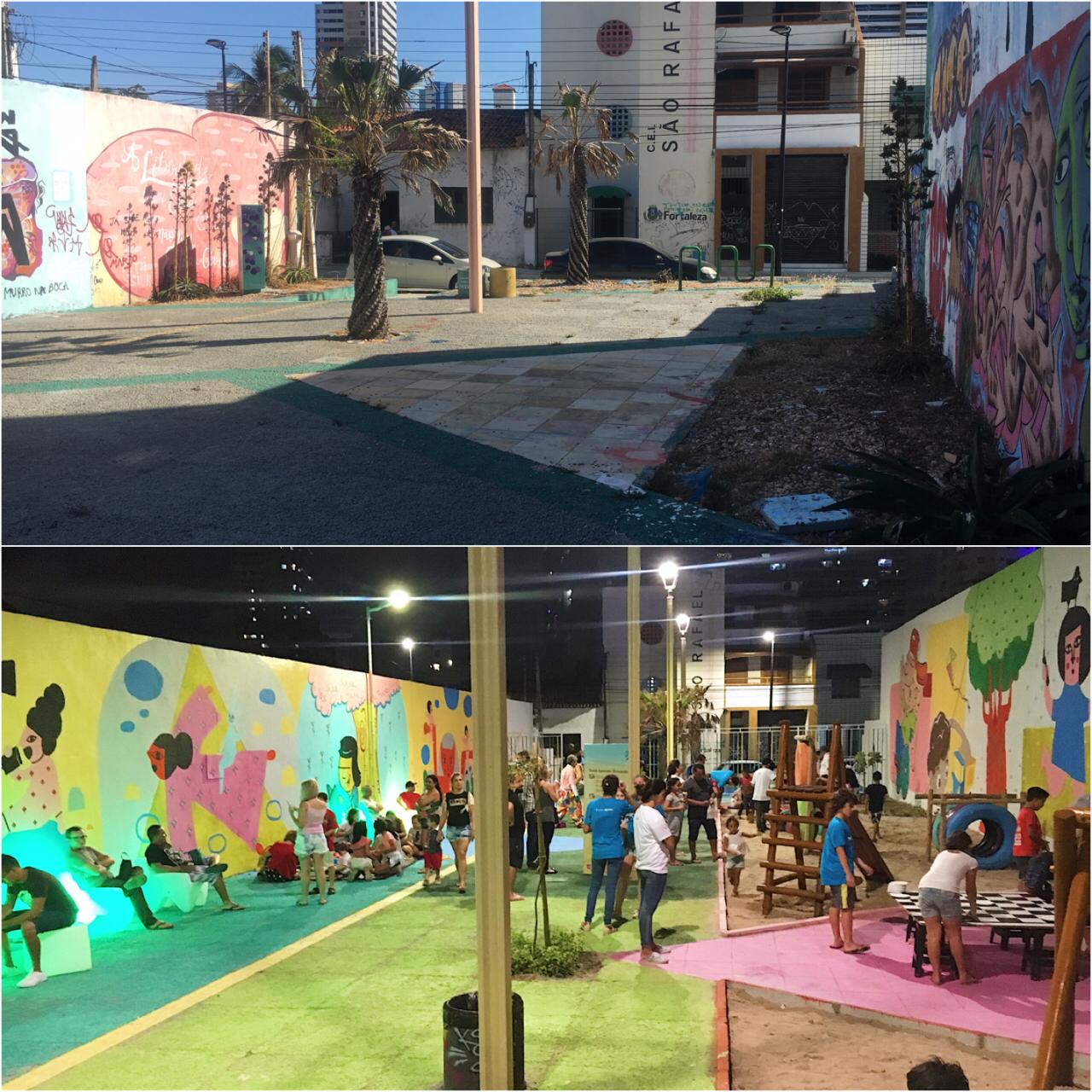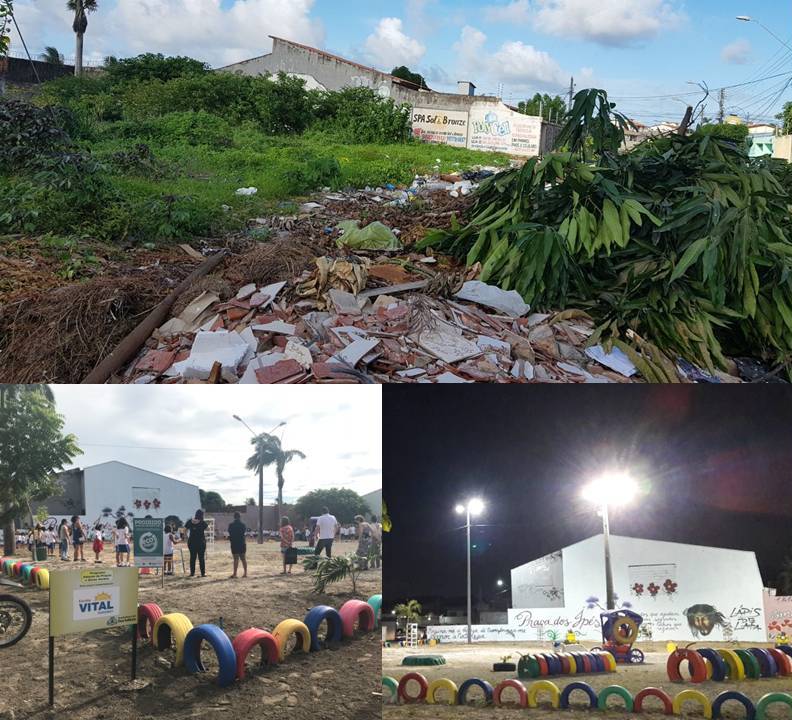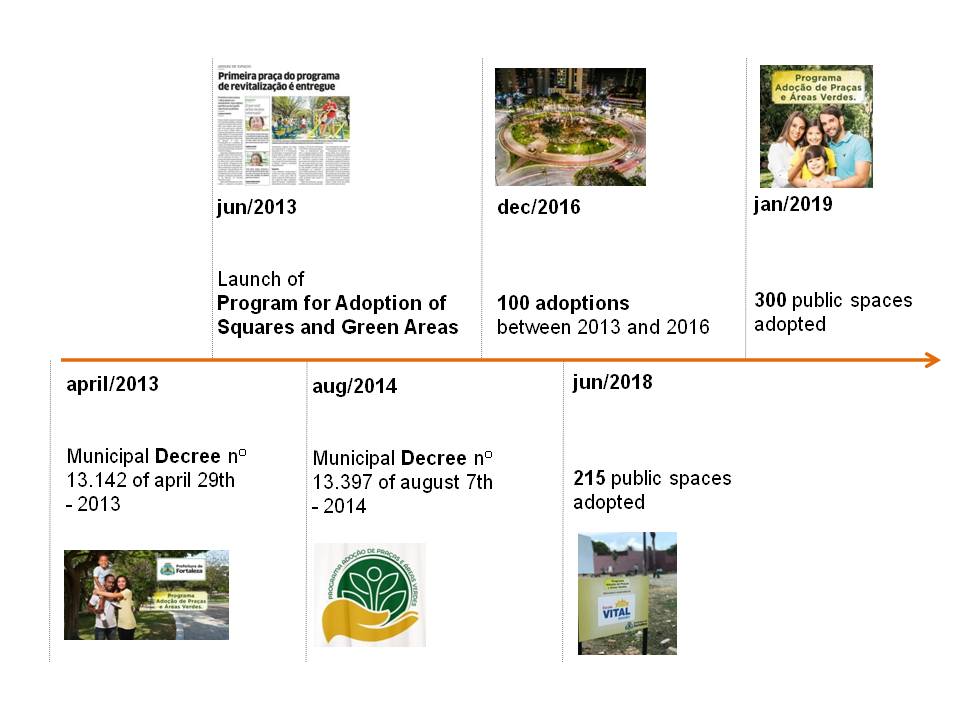Program for Adoption of Squares and Green Areas
Description
The unbridled growth characteristic of large cities in developing countries made it possible to observe the loss of control with regard to the maintenance of public spaces, hence the governance perceived the possibility of establishing partnerships with private companies and the population to share the responsibilities of actions. The Program works through a public-private partnership, assisting in the urbanization and maintenance of public spaces, as well as the awareness of the inhabitants, in order to develop preservation habits. From the launching of the Program in June 2013 to the present date, it has obtained a number of 300 adopted spaces.
The Program aims to integrate Urbanism and Environment policies. Such integration focuses on sustainable development considering its three pillars: ecologically correct, economically viable and socially just; in strict compliance with urban and environmental legislation; and the approximation and appreciation of civil society participation in decision-making processes. The attitude is innovative and represents a paradigm shift for the city, and especially for society, which usually dissociates environmental issues from urban issues. The Program has a legal basis in Decree No. 13,397 / 2014, which regulates the partnership with the private initiative and organized civil society for the maintenance of public spaces in the Municipality of Fortaleza. The Program intends to promote the participation of society in the urbanization, care and maintenance of public squares, municipal parks, flowerbeds, green areas or gardens and other areas together with the Public Power, thus transforming the city in a more inclusive, safe and acessible space.
The implementation of the Program is the result of a joint effort among several public agencies, such as the Municipal Secretariat of Urbanism and Environment - SEUMA, responsible for the coordination and technical execution of the Program, the Regional Secretariats as field collaborators of the areas to be adopted and the Legal Office of the Office of the Mayor responsible for all legal protection related to the Program. The Municipality of Landscaping and Urbanism of Fortaleza - URBFOR that, when requested, perform tree pruning and landscaping services. However, the largest collaborators involved come from civil society, who propose to contribute to the maintenance and preservation of the public spaces adopted, sharing with the costs and the workforce of the services.The methodology used is based on flowchart and with an agreement instrument, involving 3 organs of the Municipality of Fortaleza: Municipal Secretariat of Urbanism and Environment (SEUMA), Regional Secretariat and the Mayor's Office. It is intended for individuals, private entities, legal entities governed by public or private law. The interested party must submit to the Regional Secretariat the following documents: Request 01 to open the file; Form for Adoption, indicating with specificity the area and / or object of interest; Letter of intent, expressing interest in maintenance or reform and the documents of identification and proof of address. After initiation, the process must be sent to Seuma for the analysis of the project in question and being approved, it is sent to the Mayor's Office for the agreement to be finalized with the signature between the parties. After the adoption process is finished, technicians from SEUMA execute periodical inspections to check if the services described in the Work Plans are been correctly done
As for environmental impacts, because of the more active presence of the adopter, the quality of the services performed in the spaces adopted and their handling lead to notorious improvements for the development of the region, offering pleasant and clean leisure areas. The Program provides the city with an increase in public green areas for leisure and environmental preservation for the community, greater thermal comfort, shading and reduction of direct solar incidence, attenuation of noise pollution / creation of acoustic barriers and atmospheric pollution
Through the Program, social cohesion was strengthened, where individuals and companies adopt the same place together, while remaining united and integrated with the same objective, improving public spaces. This practice showed an improvement in the conservation and care with the urban furniture and the green areas making a city more pleasant and, by extension, more humane. This partnership proved to be more efficient compared to previous models.
https://catalogodeservicos.fortaleza.ce.gov.br/categoria/urbanismo-meio…
Newspaper articles:
https://www.opovo.com.br/jornal/cidades/2018/02/novos-espacos-publicos-…
http://diariodonordeste.verdesmares.com.br/cadernos/cidade/online/forta…
https://www.fortaleza.ce.gov.br/noticias/programa-adocao-de-pracas-alca…
Deliverables & Timeline
Resources mobilized
Partnership Progress
| Name | Description |
|---|
Feedback
Action Network


Timeline
Entity
SDGs
Region
- Latin America and the Caribbean
Geographical coverage
Photos



Website/More information
Countries

Contact Information
Maria ÃÂgueda Pontes Caminha Muniz, Secretary
